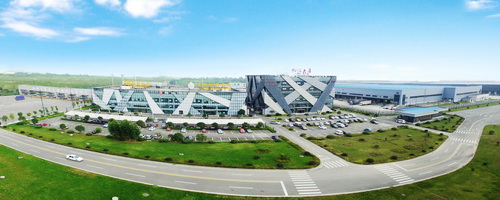Service industry at the heart of new trade zone
(chinadaily.com.cn) Updated: 2017-04-28 09:35
 |
|
Authorities in Chengdu explore methods used in the Sichuan FTZ before developing the city’s own trade zone. PHOTOS PROVIDED TO CHINA DAILY |
Chengdu, the capital of Sichuan province, is committed to promoting innovation in the trade services industry to support construction of the China (Sichuan) Pilot Free Trade Zone.
The first combined bill of lading for the Chengdu-Europe Express Railway was issued in the FTZ to a Dutch exporter on April 6, only five days after the establishment of the zone. The document allows foreign exporters to receive their payments before buyers receive their goods.
The Chengdu-Europe Express Rail service, which became operational in April 2013, is the fastest and most frequently used cargo railway route linking the city to European countries as part of China’s Belt and Road Initiative.
According to an overall plan released by the State Council on March 31, the FTZ must promote the development of an international multimodal transport model, launch pilot projects to issue combined bills of lading with guarantee functions and explore a multimodal transport model that requires only one supporting document.
The first combined bill of lading marks a significant breakthrough in the FTZ’s innovation in the trade in the services sector, according to Chengdu authorities.
Trade in services
Chengdu’s trade in services industry has reported significant growth over the past few years, due to strong government support and market demand.
Lyu Yuan, director of the trade in services department of the Chengdu Commission of Commerce, said that the city’s average year-on-year growth of added value in the service sector reached 10.3 percent during the 12th Five-Year Plan (2011-15) period, surpassing the national average by two percentage points.
In 2015, Chengdu’s added value in the service sector reached 570.4 billion yuan ($83.2 billion), ranking fourth among sub-provincial cities in China. The city is strongly positioned in tourism, computing and information, architectural design services and culture and entertainment sectors in China.
"The trade in the services industry has been growing rapidly in Chengdu in recent years," Lyu said. "The city is taking leading role in the trade in the services sector in central and west China."
Chengdu’s trade in services businesses mainly focus on four areas: aircraft maintenance and repairing, service outsourcing, technology services and culture services.
Last year, local businesses reported $1.49 billion in revenue from offshore outsourcing service projects. The city established 13 public service platforms to support 100 offshore outsourcing projects in 2016.
Chengdu Hi-Tech Industrial Development Zone’s industrial throughput value of online gaming reached 10 billion yuan in 2016, an increase of more than 40 percent year-on-year.
The local government has paid much attention to promoting development of the trade in services industry. Chengdu Commission of Commerce partnered with the city branch of the People's Bank of China to establish the Chengdu Financial Service Outsourcing Association in 2015. The association’s aim is to promote interaction between financial institutions and software information enterprises.
Last year, cultural trade-related seminars were also arranged by Chengdu governments to help cultural businesses better understand the concept of service trading.
By the end of 2016, seven cultural bases were established in Chengdu and 30 companies were recognized as key cultural trade businesses. These actions promoted development of local intangible culture heritage such as traditional handicrafts, Sichuan Opera, folk music and dance.
Chengdu was listed as a national-level service trading innovation pilot zone in February 2016 by the State Council, the only such pilot zone in western China. The city is responsible for exploring innovative development in eight areas, including service trade management systems and upgrading of development models.
- Tianzhou 1 completes historic refueling of orbiting lab
- Anti-poverty effort wins world's plaudits
- Anti-graft agency hunts 946 fugitives
- Peng says education for girls is important
- Smog battle fortified by robust plan
- Ministries cooperate to protect lawyers' rights
- 'Press on' with economic shift
- Ministry to oversee cleanup of dump sites in Hebei, Tianjin
- Processing of patents speeds up
- Xi, Trump discuss Korean situation







